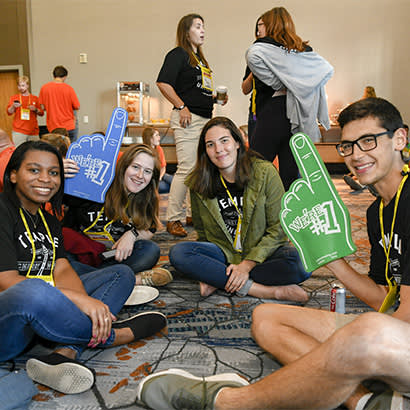
For an enhanced digital experience, read this story in the ezine.
Fair and just access to high-quality parks and green spaces, recreation facilities, youth sports, and programs promotes healthy, resilient and economically vibrant communities. The success of these areas and services are a direct result of the tireless efforts of hundreds of thousands of park and recreation professionals and volunteers. These individuals, who come from myriad backgrounds and experiences, are important for the future of parks and recreation.
Park and recreation agencies must be intentional in building and retaining a diverse workforce that will lead the field into the future. Having a staff that reflects the communities they serve is critical in ensuring agency services, programs and amenities meet the public’s needs and desires. One way to do this is by exposing young people to the many career options in the field.
The latest NRPA research report, Workforce Development and Career Exploration at Parks and Recreation, looks at programs that connect youth and young adults to the possibilities of a park and recreation career. These programs take many forms, ranging from entry-level jobs or internships to specialized skilled-based training programs. Workforce development and career exploration programs expose youth and young adults to a wide variety of occupations within the field, such as recreation programming, natural resource management, planning, operations and public safety. Program participants gain valuable work experience, build self-confidence, develop foundational skills and learn how rewarding a park and recreation career can be.
Three in 10 park and recreation agencies currently offer a workforce development and/or career exploration program that targets teenagers, young adults and other people entering the labor force for the first time. Fifty-six percent of survey respondents from urban agencies report having one of these programs.
Park and recreation leaders view workforce development and career exploration programs as a key method to developing future professionals and leaders in the field. Many young adults have their first-ever job at a local park and recreation agency, providing not only a chance to earn money, but also a place where they can build self-confidence and gain valuable work experience. Forty-two percent of these leaders indicate that a critical goal of their agencies’ workforce development and career exploration programs is to recruit a more diverse agency staff.
Partnerships are essential to the success of many park and recreation workforce development and career exploration programs. Partners assist in recruiting participants, providing mentoring services, and providing financial and logistic support. Eighty-eight percent of park and recreation agencies partner with one or more organizations (e.g., nonprofit organizations, local school systems, other non-school local government departments) to implement these programs. Agency locale plays a large role in determining the type of workforce development partnership. Non-school local government departments are more common partners for urban agencies (77 percent) than for suburban (49 percent) or rural (36 percent) agencies. Conversely, an overwhelming majority of rural park and recreation agencies partner with their local school system (90 percent), well above the percentage of urban (53 percent) and suburban (54 percent) agencies that do so.
While the coronavirus (COVID-19) pandemic has put a strain on workforce development and career exploration programs, sharply reducing the opportunities for youth and young adults to interact with current park and recreation professionals, opportunities do exist and planning for the future generation continues. Park and recreation professionals indicate these programs are likely to become more common over the next few years. One in five park and recreation leaders is looking to establish workforce development and career exploration programs at their agencies within the next two years. Sustainable funding, partnership development and increased training will ensure that these programs lead to an innovative and equitable future for parks and recreation.
Melissa May is NRPA’s Senior Research Manager.

